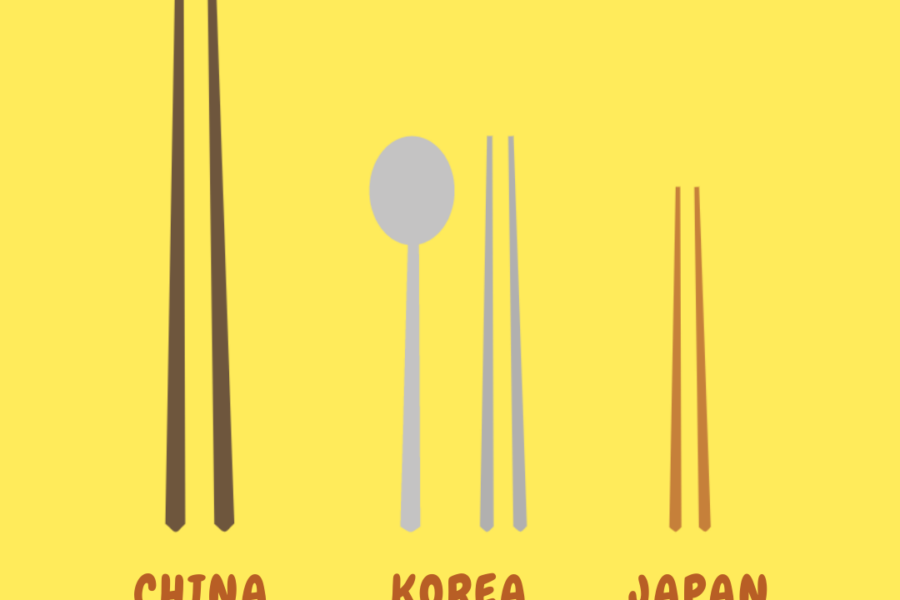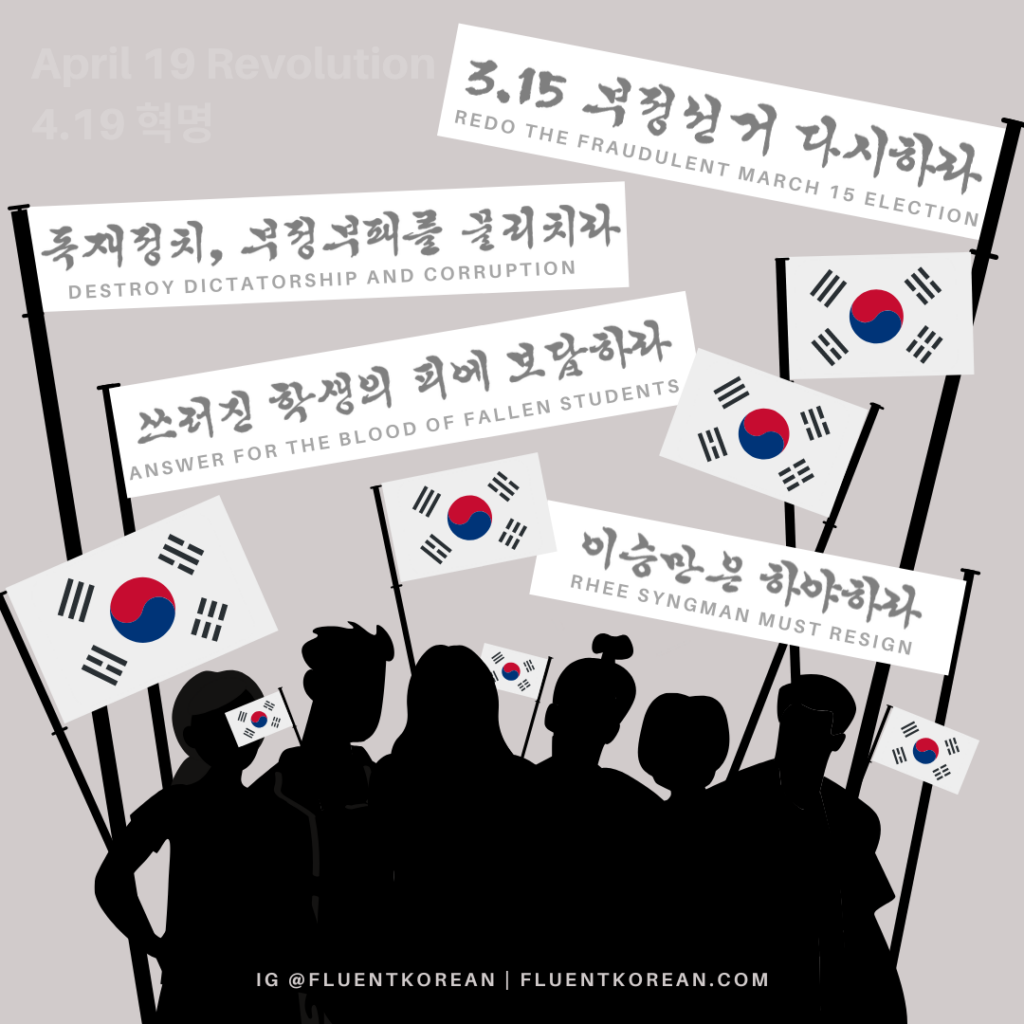
On the heels of the 2020 General Elections which saw one of the highest voter turnouts in almost three decades in the midst of a global pandemic, today (April 19, 2020) marks the 60th anniversary of the April 19 Revolution (4.19 혁명, 四一九革命), a student-led uprising which removed a leader who sought to maintain power through any means necessary with no regard for the lives of those he actually served – the Korean people. I am so grateful to the people who sacrificed their lives in the name of freedom, democracy, and justice and proving that nobody is “too young” to make a difference. The April Revolution of 1960 is also one of the early examples of Korean mass protests; a strong foundation to the country’s prevailing need to hold wayward politicians accountable.
Background Leading to the Revolution
US-educated Rhee Syngman (이승만) became the first elected president of the First Republic of Korea in 1948. His administration was largely characterized by authoritarianism, anti-communism (that would put McCarthy to shame), corruption, pro-Americanism with a heavy reliance on US aid. He ruled with an iron fist. In his second term, he removed term restrictions from the constitution. Public approval was at an all-time low, but he handled political and civilian opposition by accusing them of being communist and executing them.
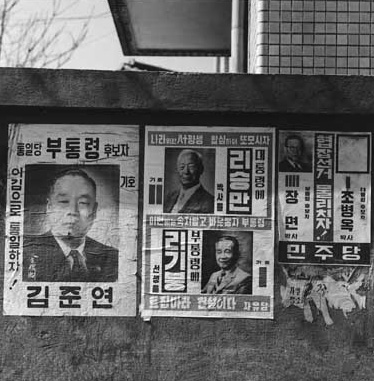
In the 1960 elections, he won “unopposed” when his opponent Cho Byeong-ok (조병옥) of the Democratic Party died suddenly and mysteriously before the vote. With the presidential election ending in disappointment, the general public turned their attention to the vice presidential race. Rhee’s ally and protégé, Lee Ki-Poong (리기붕), who despite being mostly bed-ridden at the time, won in a landslide.
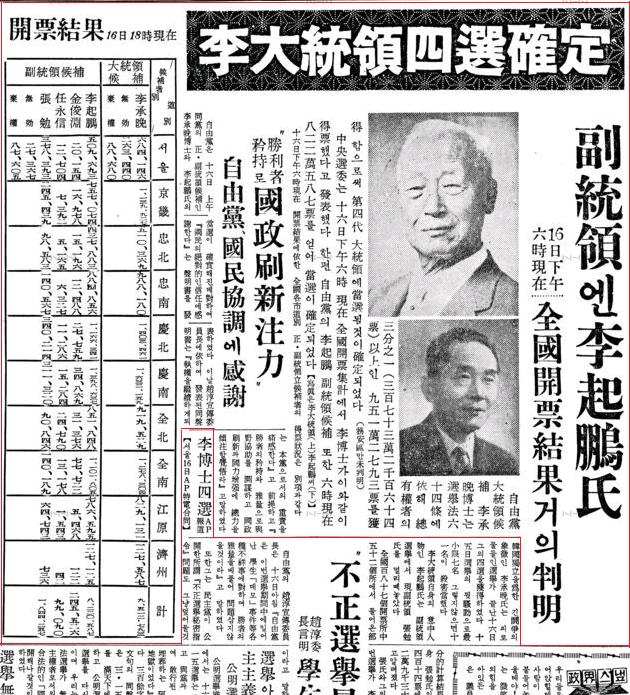
(Image Source: 동아일보)
When the results were announced, the opposition declared it was fraudulent. Many reports of ballot stuffing, switching ballots, and removing ballots voting for the opposition surfaced. Public frustration reached a tipping point and student protests began in Masan city. Mind you, most of the protesters were high school students or recently graduated. Police responded with violence. The March 15 protests are now credited as being Korea’s first pro-democracy movement.
About a month later, a fisherman found the body of Kim Ju-Yeol (김주열), a high school student who went missing during the protest. When authorities didn’t release autopsy results, citizens stormed into the hospital and confirmed with their own eyes his tragic end involving a tear-gas grenade. There were efforts to censor the news and accuse the student of being a communist, but the truth had already gone “viral”.
The Revolution Spreads to Seoul
On April 18, in Seoul, around 3,000 university students protested at the National Assembly and were attacked by Rhee-supported anti-communist groups. The next day, on April 19, more students mobilized and around 40,000 high school and college students marched from campuses to government buildings to the president’s residence to call for Rhee’s resignation. Protesters set fire to some government buildings and destroyed statues of Rhee Syngman. Police responded with force, killing hundreds and wounding thousands. Martial law was declared.
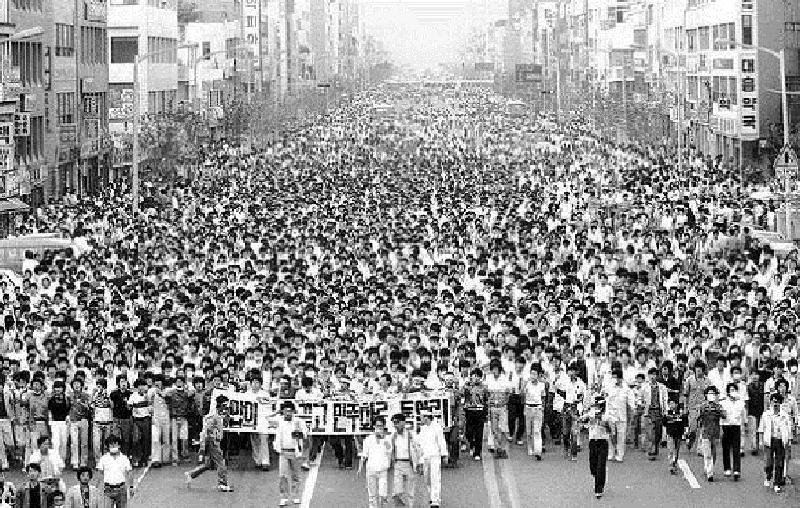
(Image Source: 하루1분 시사상식 – 4.19 혁명)
At first, there were clashes, but when protesters swelled to around 100,000, even the soldiers refused to attack the public, effectively turning their back on Rhee’s regime.
After the April 19 student protest, on April 25, university professors from all over the country gathered and marched through the streets of Seoul. They carried signs which read “answer for the blood of fallen students”. The support of university faculty ignited more students to join the protests. America withdrew their support for Rhee.
Without military backing, US support, and national resistance from Korean people, Rhee stepped down on April 26. He promptly boarded a US military aircraft to Hawaii, never to return to his homeland again. He denied any responsibility and blamed any and all corruption on Lee. As he was making preparations for him and his family to leave the country, Vice President Lee and his family were murdered by his oldest son (a soldier stationed on a university campus) who then also took his own life. In Korean, we use the term myeolmunjihwa (멸문지화, 滅門之禍) which means his whole family line was exterminated and brought to ruin.
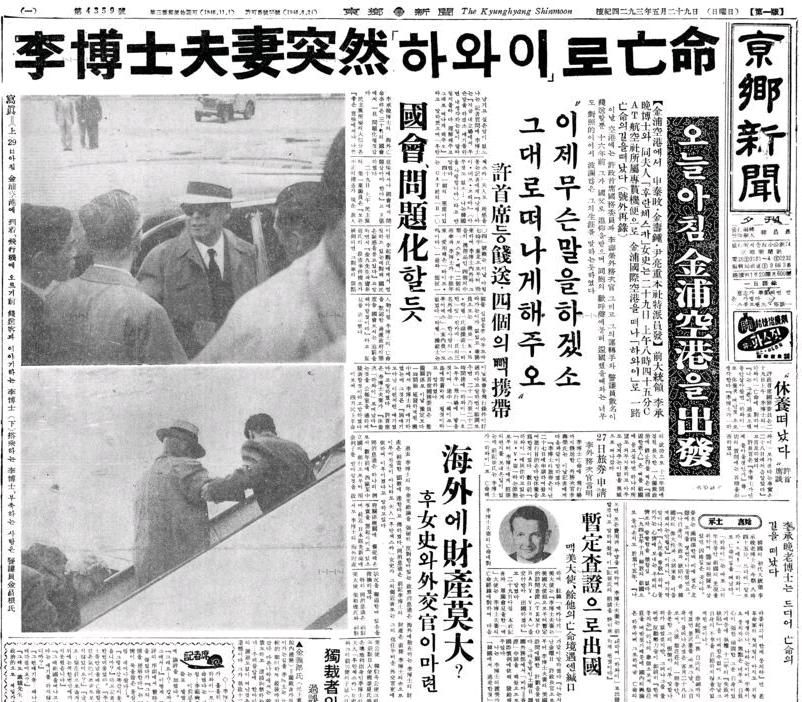
(Image Source: 경향신문)
Immediately after Rhee’s resignation, celebrations erupted all over the country. Arrested students were released by the thousands. Students took leadership roles in their communities, directed traffic, and cleaned up the debris in the streets. Hope for a new democracy filled the country.
Later, new elections were held for the (short-lived) Second Republic of Korea which adopted a parliamentary government to limit the powers of the president.
Further Reading
Seoul National University Student Association, April Revolution, First Statement (April 19, 1960)
We, who have stormed down from the ivory tower of truth, armed with the spirit of academia, throw ourselves into the turbulence and confusion of history in order to sow the seeds of reason and truth in the depleted, barren soil of reality.
We are summoned today, by the solemn command of our conscience, to condemn wickedness and cruelty and to respond with our individual senses of duty, with honor and clarity.
What we know is that these dark, recent paths have resulted from a brute, totalitarian abuse of authority disguised as democracy and freedom. But history has shown us that, in the struggle for democratic freedom, despotism is no more formidable an opponent than a tiger made of paper – a mere pretense of power.
Though the university is but recent in Korea’s history, we are proud to lead the fight against the impostors, who offer only the façade of democracy. We consider it the highest honor to lead the struggle against the regime.
The foundation of modern democracy is freedom. Reason gives us insight into the fact that freedom is not just slipping away from us, but it is being taken away – forcefully and thoroughly, by its very roots.
The battlefield of freedom has now been set ablaze. This whole field – which justly belongs to the people – is now in the process of being reclaimed -- and it will be reclaimed by the generations to come.
These corrupt systems and their bureaucracies – which should have been serving the democratic people – have shed their patronizing masks of false democracy and revealed themselves to be puppets of authority. The evil influence of political power has swallowed up the people's right to fair elections, which constitutes a minimum requirement of democracy. The freedoms of speech, assembly, association, and thought, which flickered like a flame have been snuffed out completely by vicious powers. We've been in the long, coal-black darkness of night.
Just look at young student Kim Ju-yeol’s gruesome corpse! It is clear proof of the totalitarian state’s abuse of power.
Look at them! How despicably they treat us, with violence and threats. Even if it costs us what we hold dear, we feel our conscience urging us to cry out and fight back.
Behold! Brimming with joy, we raise the torch of freedom!
Behold! In the dark and silent night, we proudly strike the bell of freedom! Alongside our fathers, who stood with their brothers as they wholeheartedly fought for and cheered for freedom at the end of Japanese colonial rule, we feel no shame or embarrassment. We feel no loneliness. We feel only honor to defend eternal democracy even if it means our deaths.
Behold! Even those in the gutters, who brood in self-torture at their cowardice, crawl out and follow our ranks!
Let us go forth! The key to freedom is simply courage. We are comprised of those who have ardent love for reason, conscience, peace, and freedom. Justice is on our side.
서울대학교 문리대 학생회 4월 혁명 제1선언문
상아의 진리탑을 박차고 거리에 나선 우리는 질풍과 같은 역사의 조류에 자신을 참여시킴으로써 이성과 진리, 그리고 자유의 대학정신을 현실의 참담한 박토(薄土)에 뿌리려 하는 바이다.
오늘의 우리는 자신들의 지성과 양심의 엄숙한 명령으로 하여 사악(邪惡)과 잔학(殘虐)의 현상을 규탄 광정(匡正)하려고 주체적 판단과 사명감의 발로임을 떳떳이 선명하는 바이다.
우리의 지성은 암담한 이 거리의 현상이 민주와 자유를 위장한 전체주의의 표독한 전횡에 기인한 것임을 단정한다. 무릇 모든 민주주의의 정치사는 자유의 투쟁사이나 그것은 또한 여하한 형태의 전제정치도 민중 앞에 군림하는 종이로 만든 호랑이 같이 어설픈 것임을 알려 준다.
한국의 일천한 대학의 역사가 적색전제(赤色專制)에의 과감한 투쟁의 거획(巨劃)을 담당하고 있는 데 크나큰 자부를 느끼는 것과 똑같은 논리의 연역(演繹)에서 민주주의를 위장한 백색전제(白色專制)에의 항의를 가장 높은 영광으로 우리는 자부한다.
근대적 민주주의의 근간은 자유다. 우리에게서 자유는 상실되어가고 있다는 것을, 아니 송두리째 박탈되고 있다는 것을 우리는 이성의 혜안(慧眼)으로 직시한다.
이제 막 자유의 전장엔 불이 붙기 시작하였다. 정당히 가져야 할 권리를 탈환하기 위한 자유의 전역(戰域)은 바야흐로 풍성해 가고 있는 것이다.
민주주의와 민중의 공복(公僕)이며 중립적 권력체인 관료와 경찰은 민주를 위장한 가부장적 전제 권력의 하수인으로 발 벗었다. 민주주의 이념에서 가장 기본적인 공리인 선거권마저 권력의 마수 앞에 농단되었다. 언론⋅출판⋅집회⋅결사 및 사상의 자유의 불빛은 무식한 전제 권력의 악랄한 발악으로 하여 깜박이던 빛조차 사라졌다. 긴 칠흑 같은 밤의 계속이다.
나이 어린 학생 김주열의 참혹한 시신을 보라! 그것은 가식 없는 전제주의 전횡의 발가벗은 나상(裸像)밖에 아무것도 아니다.
저들을 보라! 비굴하게도 위하(威嚇)와 폭력으로써 우리들을 대하려 한다. 우리는 백보를 양보하고라도 인간적으로 부르짖어야 할 같은 학생의 양심을 느낀다.
보라! 우리는 기쁨에 넘쳐 자유의 횃불을 올린다.
보라! 우리는 캄캄한 밤의 침묵에 자유의 종을 난타하는 타수(打手)의 일익(一翼)임을 자랑한다. 일제의 철퇴 하에 미칠 듯 자유를 환호한 나의 아버지 형제들과 같이 양심은 부끄럽지 않다. 외롭지도 않다. 영원한 민주주의의 사수파(死守派)는 영광스럽기만 하다.
보라! 현실의 뒷골목에서 용기 없는 자학을 되씹는 자까지 우리의 대열을 따른다.
나가자! 자유의 비결은 용기일 뿐이다. 우리의 대열은 이성과 양심과 평화, 그리고 자유에의 열렬한 사랑의 대열이다. 모든 법은 우리를 보장한다.
Bibliography/References
- Katsiaficas, George. (2016). Global Significance of the April 19 Revolution in South Korea.
- Katsiaficas, George N. Asia’s Unknown Uprisings: South Korean Social Movements in the 20th Century. PM Press, 2012.
- April 19 Revolution – 4.19 혁명
- Stone, Alan. “The Korean Student Revolution: A Political Analysis.” Occasional Papers on Korea, no. 2, 1974, pp. 132–143. JSTOR, www.jstor.org/stable/41490394. Accessed 19 Apr. 2020.
- Global Non-Violent Action Database – South Korean students force dictator to resign, new elections, 1960
- Seoul National University Newsroom – SNU’s Manifesto of April 19 Revolution
- 우리역사넷 – National Institute of Korean History – 서울대 4.19 선언문(1960. 4. 19)z


